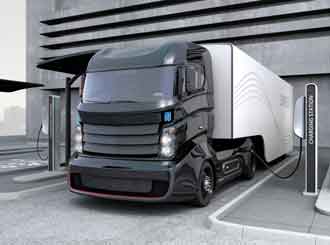Investors are eager to buy TuSimple stock because the company's driverless truck plan could revolutionize the freight industry. And that's big business.
At the end of the day, if the trucks stop rolling, the United States goes out of work.
Eighty percent of all freight in the United States spends some time in a truck being delivered to a point in the supply chain. Plus, e-commerce made $861 billion for 2020, a number not expected until 2022, to boost long-distance truck hauling.

And just in time, we get the TuSimple IPO.
TuSimple stock started trading this week under the ticker symbol "TSP."
With such rapid growth in e-commerce and general shipping, it would make sense to see more EV stocks specializing in trucks going public.
But what TuSimple adds to the EV industry is the real story. Here's whether or not TuSimple stock is a buy after the initial public offering.
What Is TuSimple?
Something e-commerce growth has not done is create enough truck drivers to meet the new demand. Drivers are hard to find, and turnover is high.
Driving a big truck hundreds of miles a day is a tough job. It pays OK, with Salary.Com reporting an average pay of around $50,000 annually. But, of course, you earn your pay.
It is not just a tough job; it is a dangerous job as well. According to the National Highway Traffic Safety Administration, from 2009 to 2019, the number of persons injured in crashes involving large trucks more than doubled from 74,000 to 159,000. The NHTA also estimates that 93% of those accidents are from human error.
The costs are high as well. Paying salaries and benefits to truck drivers can be as much as 40% of the cost per mile to deliver products to the marketplace.
Here's where TuSimple comes in. The company is working on an autonomous technology that it believes can help keep the trucks rolling in a safer, less-costly fashion.
It's doing this on quite an impressive scale, too...
What Makes TuSimple a Unique EV Stock
TuSimple works with a network of carriers, shippers, railroads, freight brokers, and equipment manufacturers to develop an Autonomous Freight Network.
This would be a network of driverless trucks in an expanding nationwide network of HD digital mapped routes and terminals. This would include an operational oversight system operated by TuSimple.
These routes currently span over 3,000 miles across the United States. TuSimple expects to cover the 46,000-mile U.S. Interstate System by 2024.
TuSimple is working with Navistar International Corp. (NYSE: NAV) and Volkswagen AG's (OTCMKTS: VWAGY) trucking unit, Traton SE (OTCMKTS: TRATF), to build the first vertically integrated L4 purpose-built autonomous semi-truck. L4 means that the vehicle is able to run with no human interaction in most cases.
TuSimple driverless trucks will use autonomous driving software paired with its TuSimple Connect cloud-based autonomous operations oversight system to navigate routes.
The trucks should be ready for production in 2024.

$1.4 Trillion 5G Aftershock
5G is creating a $1.4 trillion aftershock market - and 20 small companies could produce 10X gains by the end of the year.

$1.4 Trillion 5G Aftershock
5G is creating a $1.4 trillion aftershock market - and 20 small companies could produce 10X gains by the end of this year.
TuSimple hopes to be the middle-mile shipper that can get goods from the production source to the delivery locale. Once they arrive at the terminal, they can then be handled by last-mile shipping companies to get the products to the store or home.
TuSimple is working to develop a network of terminals to act as the shipping points for the network.
If successful, TuSimple autonomous trucks and networks can solve a lot of problems for the shipping industry. The demand for drivers will be eliminated, and costs will be dramatically reduced. Autonomous trucks should be able to operate more hours in a day without sacrificing safety.
As a bonus, autonomous trucks should reduce carbon emissions by 10% through more efficient operations. That's actually a big deal, since the U.S. Environmental Protection Agency estimates that heavy duty trucks generate about 27% of U.S. greenhouse gas emissions.
So, TuSimple is thinking in the right direction. Does that necessarily translate to action?
Let's see...
Should You Buy TuSimple Stock?
Autonomous trucking could be a giant leap forward for the shipping industry.
That does not mean that we should run out and buy shares on TuSimple.
Really, this is an idea, not a company. TuSimple had revenue of $1.8 million last year and lost more than $177 million.
Its technology remains untested for the most part.
The government has not really decided how it will deal with autonomous trucks yet. While we think that state and local government are generally in favor of the concept, there are still a lot of questions about safety.
One fatal crash involving a software failure, and the future of autonomous trucking will be set back by a lengthy period of time.
It is also going to put a lot of truck drivers out of work. And we can't imagine the Teamsters Union is going to be thrilled by that development.
If everything goes right, this could be a wonderful business. The problem is that at current prices, you will be paying over $6 billion for an untested idea.
Driverless trucking is going to produce some huge winners and some huge losers. It will take time to figure out who is which.
You can certainly arrive a little later to the autonomous trucking party and still make an enormous amount of money with a fraction of the risk of buying today.
Put These Tiny Cryptos on Your Radar NOW
A surge of interest from institutional investors is setting the stage for a rally in a slew of small digital coins.
But understand this: These under-the-radar players are much more affordable than Bitcoin.
Some are so hot, even a small stake could transform into a humble fortune in 2021.
One is trading for around $12 – and could deliver a 638% profit by the end of this year.
Follow Money Morning on Facebook and Twitter.
About the Author
Mike Stenger, Associate Editor for Money Morning at Money Map Press, graduated from the Perdue School of Business at Salisbury University. He has combined his degree in Economics with an interest in emerging technologies by finding where tech and finance overlap. Today, he studies the cybersecurity sector, AI, streaming, and the Cloud.



